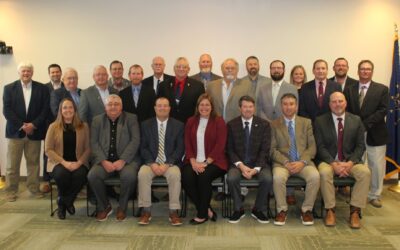Fleet operators encouraged to use plant-based, sustainable solutions
INDIANAPOLIS (May 20, 2021) — Soybean fields could hold the keys to a more sustainable transportation system. By using fuel, motor oils, hydraulic fluid, degreasers – even tires – made from soybean oil, fleets can reduce petroleum use, cut carbon footprints and improve worker safety.
In a recent webinar hosted by Greater Indiana Clean Cities, the American Lung Association, Indiana Soybean Alliance and the B20 Club of Indiana, industry experts discussed the benefits of soy-based products for fleets.
“These products are currently used by large cities and small communities, government agencies and private corporations, national parks and city parks, all to enhance their sustainability programs and raise the level of environmental and employee health and safety,” said Chris Case, biobased products use specialist with the United Soybean Board. “Many communities are removing a wide range of petroleum-based products from their vehicles and substituting them with biobased.”
Why consider biobased products?
Here are benefits of using biobased products in fleet operations:
- Fewer harmful engine emissions. Biodiesel fuel made from soybean oil and other renewable fats and oils generates lower emissions of carbon dioxide and particulate matter. “Microscopic airborne particulates can lead to both short- and long-term health problems when inhaled and trapped in lungs,” said Bailey Arnold, senior manager of clean air initiatives at American Lung Association. “Biodiesel is one of the technologies we have available now to reduce pollution and reduce carbon to combat climate change and protect our health,” Arnold said.
- Less employee exposure. Petroleum-based lubricants, degreasers and cleaning supplies may expose fleet maintenance workers to harmful chemicals or fumes that could lead to headaches, skin rashes or other ailments, according to Case. “Biobased products can provide workers with a safer environment without sacrificing performance,” he said.
- Lower clean-up costs. Soy-based products such as hydraulic fluids are biodegradable and easier to mitigate than petroleum in the event of a spill or release. “For water departments or marine-based operations, this is especially important to protect water resources,” Case said.
Performance equal or better
Fleet managers can expect performance of biobased alternatives made from soy to be equal to or better than comparable petroleum-based products.
“The biobased industry is doing everything it can to ensure the quality of their products not only meets basic standards but goes beyond them,” said Ronald Flowers, biobased consultant to the United Soybean Board, and president of RK Solutions LLC, a fleet management company. “Biodiesel is a prime example of how the industry meets or exceeds ASTM (American Society of the International Association for Testing Materials) and other standards without requiring equipment modifications.”
User experiences
Tim Fitzgerald, director of fleet management at DC Water in Washington, D.C., incorporates multiple soy-based products into its fleet operations. These include biodiesel, as well as two-cycle engine oil, pressure grease, all-purpose degreasers, parts cleaners and high-performance lubricants.
“We’ve always looked for ways to have an environmental advantage and to do things smarter and in a manner that is not cost prohibitive for us as an enterprise,” Fitzgerald said. “We have seen no fall off or degradation in performance with biobased products.”
Scott Piszczor is the Midwest lubricants manager for Al Warren Oil Co. in Hammond, Ind., which markets biodiesel along with other fuels and lubricants. To ensure customers have positive results with biodiesel, Piszczor and his team follow best practices that include keeping fuel tanks clean, stepping up gradually to higher biodiesel blends, and using proper cold-flow additives to ensure efficient operation during winter. Piszczor also highlighted Al Warren Oil and sister company Altom Transport’s use of B20 biodiesel in more than 300 vehicles.
Where to get help
Flowers encouraged fleet managers to test biobased products and establish relationships with suppliers that offer them. Resources are available to help fleets transition to biodiesel and other biobased products, including grants through the Diesel Emission Reduction Act.
For more information on available resources, visit greaterindiana.com, cleanairchoice.org, B20clubindiana.org or soybiobased.org
###
About Indiana Soybean Alliance: The Indiana Soybean Alliance works to enhance the viability of Indiana soybean farmers through the effective and efficient investment of soybean checkoff funds that protect and promote the interest of Indiana soybean farmers. The ISA works to assist soybean farmers through its strategic initiatives of market development; environmental, social and economic sustainability; value creation and producer engagement. ISA is led by an elected, farmer board that directs investments of the soybean checkoff funds on behalf of more than 20,000 Indiana soybean farmers. Learn more at indianasoybean.com
About Greater Indiana Clean Cities: Greater Indiana is a standalone nonprofit focused on advancing communities with education and resources on alternative fuel vehicles. Our mission is to advance alternative, domestic fueled transportation including energy efficient technologies across all sectors in Indiana. The 501(c)3 organization serves the entire state of Indiana, working with public and private sector members. Greater Indiana is a resource for members integrating alternative fuels, technologies, and efficiency measures. Learn more at greaterindiana.com
The American Lung Association is the leading organization working to save lives by improving lung health and preventing lung disease through education, advocacy, and research. The Association’s Department of Clean Air Initiatives is dedicated to providing clean air for all through its award-winning Clean Air Choice® program, which focuses on promoting and implementing alternative fuels and technologies. Learn more at cleanairchoice.org
The B20 Club of Indiana is a collaboration between the Indiana Soybean Alliance and the American Lung Association that showcases exceptional green fleets with experience using B20 or higher biodiesel blends in the state of Indiana. Learn more at B20clubindiana.org
Posted: May 21, 2021
Category: ISA, ISA Press Releases, Press Releases




